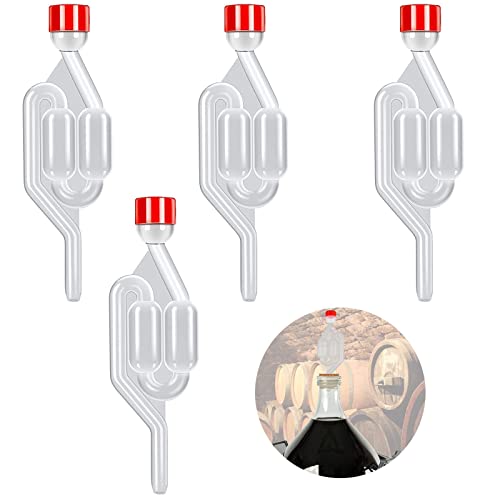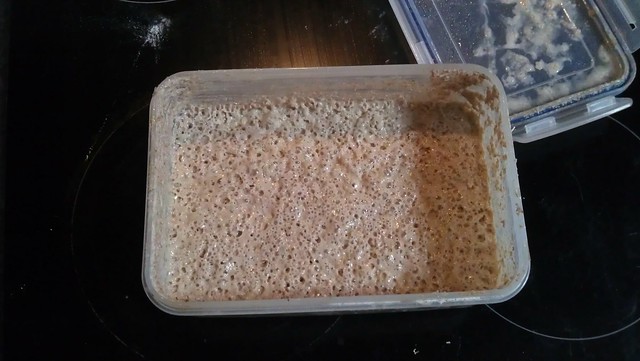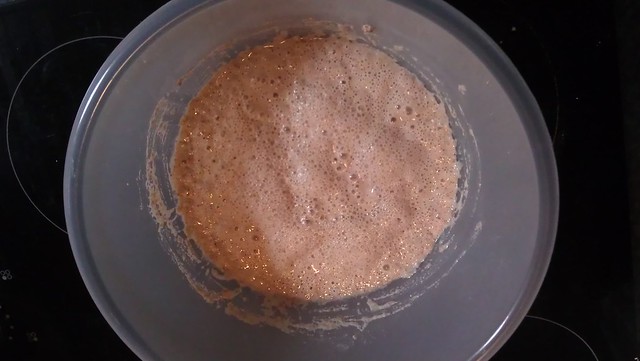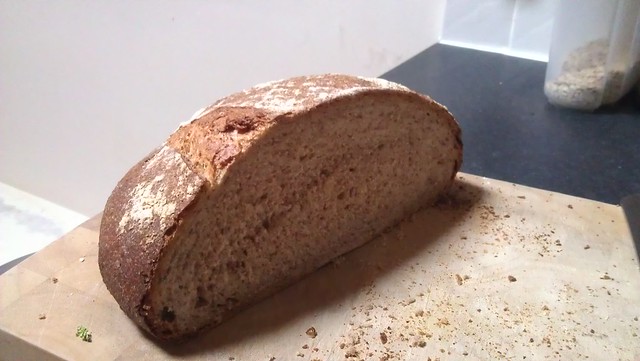It's nice to see such an enthusiastic baking community on here. I'm glad I'm not the only one who sees the correlation between brewing and baking.
I got into baking thanks to a Jamie Oliver cookbook I bought to help me get away from the traditional student diet when I was at uni. My first attempt was awful - I didn't realise that the yeast I was using needed activating.
Since then I've tried various methods and I'm currently working through one of Peter Reinhart's books (Crust and Crumb I think it's called but it's in the kitchen and I'm not). He's very keen on long, slow fermentation for pretty much any loaf. Most recipes involve overnight "retarding" in the fridge and, in some cases, multiple retardings. His french loaf recipe is great. It takes three days to build but there are really only two bursts of activity being the kneading and baking. The other steps are generally a couple of minutes here and there.
I've not quite built up to trying Reinhart's approach to sourdoughs but I do use Hugh Fernley-Wittingstalls sourdough recipe (combined with some of the oven techniques from Reinhart) and have been getting great results this time round. I think in the past I've always used the started before it was really ready and have been put off by the results and let the culture die. This time it's going so well that I'm concerned about the fact that I'm going away for a few days so I need to remember to feed and refrigerate the starter before I go.
My current recipe is really simple but still needs a days prep before baking. My sourdough has been built up using just wholemeal bread flour and water. It's now been alive for about a month and is really starting to develop great flavour.
The recipe -
Stage 1 - The sponge
About 100ml of starter
250g bread flour (I use a 50:50 mix of white and wholemeal)
275ml water
Mix together well in a large bowl, cover and leave for about 8 - 12 hours. I tend to start at about 8pm and leave it over night.
Stage 2 - The dough
300g bread flour
1tbs olive oil
10g salt
Add ingredients to the sponge and combine. The consistency at this point is very important. The dough needs to be slightly wet. I find this hard to judge until I start kneading so tend to er on the side of caution and add a little more water. It's much easier to add extra flour once kneading than it is to add water. Turn out the dough and knead for about 15 minutes. Put the dough into a lightly oiled bowl (though low calorie sprays are handy for this), oil the dough, cover and leave to raise for about 8 hours.
Stage 3 - Shaping
Gently knock back the dough (if you are too rough you'll lose the wonderful irregular crumb found in sourdoughs) and shape into a boule or whatever shape you want. Place into a heavily floured proving basket (or in my case fruit bowl with clean tea towel) and leave to raise for a further 3 hours.
Stage 4 - Baking
30 minutes before you want to bake the loaf preheat the oven to ~250C (my oven only goes up to 235 and works fine) with either a baking stone or up turned baking tray on the middle shelf and a roasting tray or similar on the bottom.
Turn the loaf out onto a baking sheet (no lip! you need to slide the loaf onto the baking stone) with lightly floured baking paper and score the top in your desired pattern with a sharp knife (a double sided razor blade on a wooden coffee stirrer works well).
Pour a cup of boiling water into the roasting tin and use a spray bottle full of water to greate a good mist in the oven. Leave a couple of minutes (close the door!) and then slide the loaf onto the stone/tray. Mist the oven again with the spray bottle another 2 times at 2 minute intervals. Leave for 10 minutes after the final spray then reduce the oven temp to 200C. After another 10 minutes turn the loaf 180 degrees as most ovens don't cook evenly. Bake for a further 15 minutes. Check the loaf for the traditional hollow sound. If it's not ready bake for a further 5 minutes - repeat until done. Once ready turn the oven off and leave the loaf in the cooling oven for 10 minutes. Remove the loaf and place on a cooling rack for at least 30 minutes.
Obviously the baking is the most complicated stage but I truly believe that it's all necessary to get the best flavour, crust and crumb from the loaf.
A few pictures of the process (only the stage I've got on the go at the moment I'm afraid)
The starter after good feed last night (100g flour and enough water to keep consistency)
The sponge after being left overnight
Last night's bake - the ridge in the crumb is due some cack handed slicing








































![BREWING THERMOMETER STICKERS ACCURATELY MONITOR FERMENTING BEER & WINE LIQUID TEMPERATURES 5PCS HOME BREW SPIRITS WINE LCD ADHESIVE [US]](https://m.media-amazon.com/images/I/311DDjo2X3L._SL500_.jpg)


